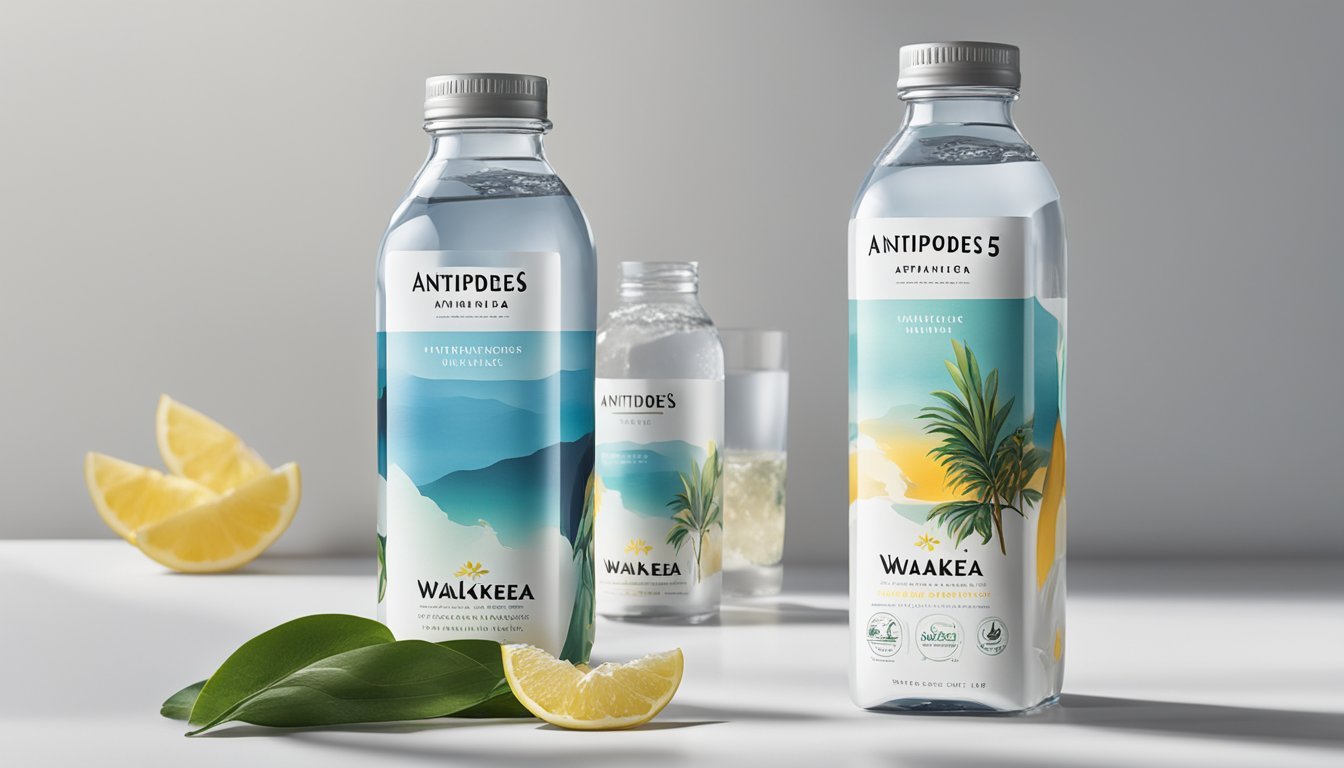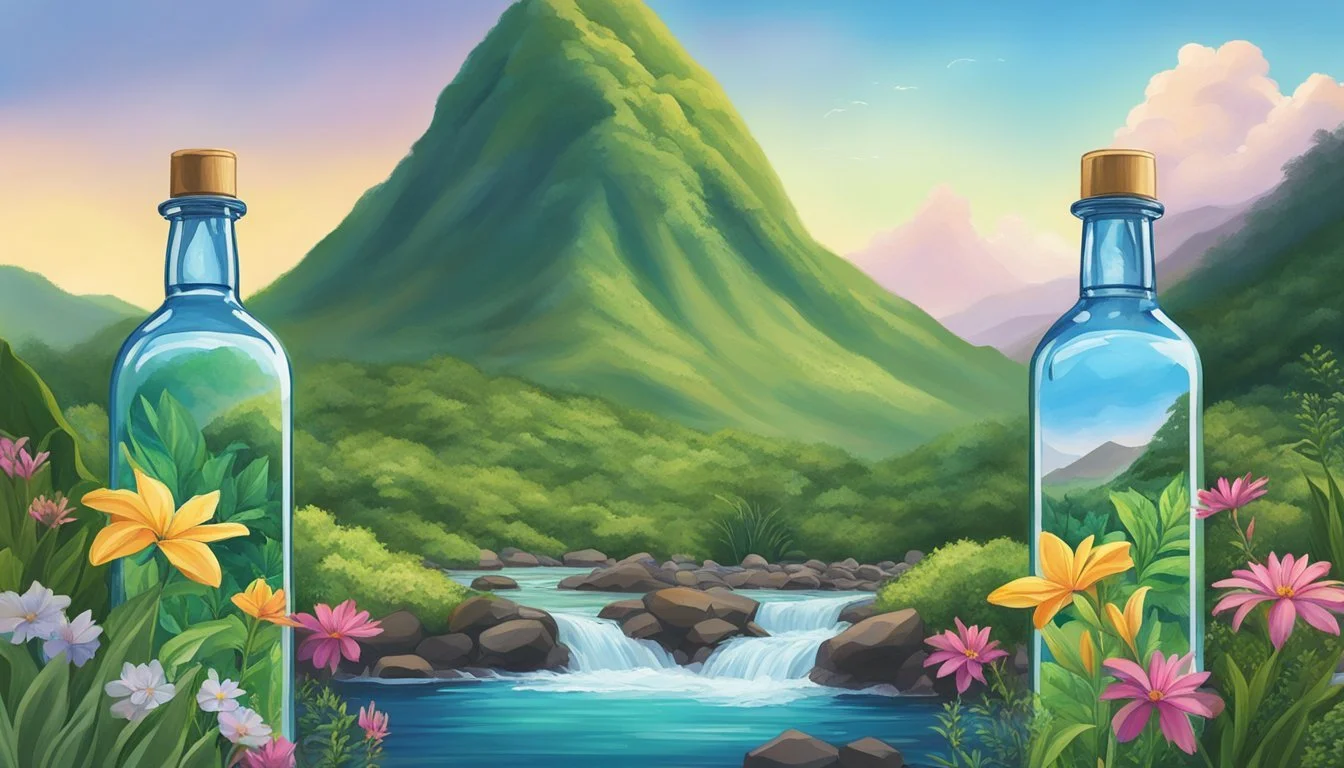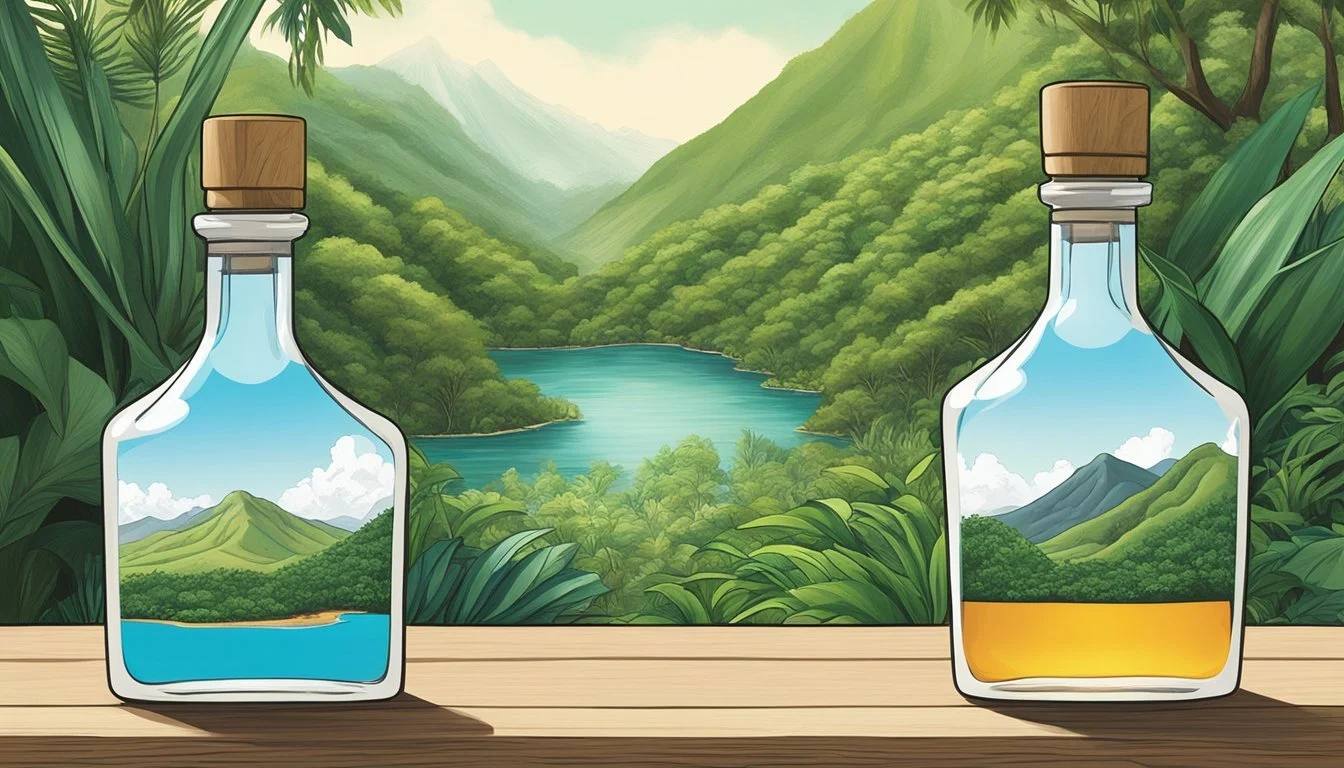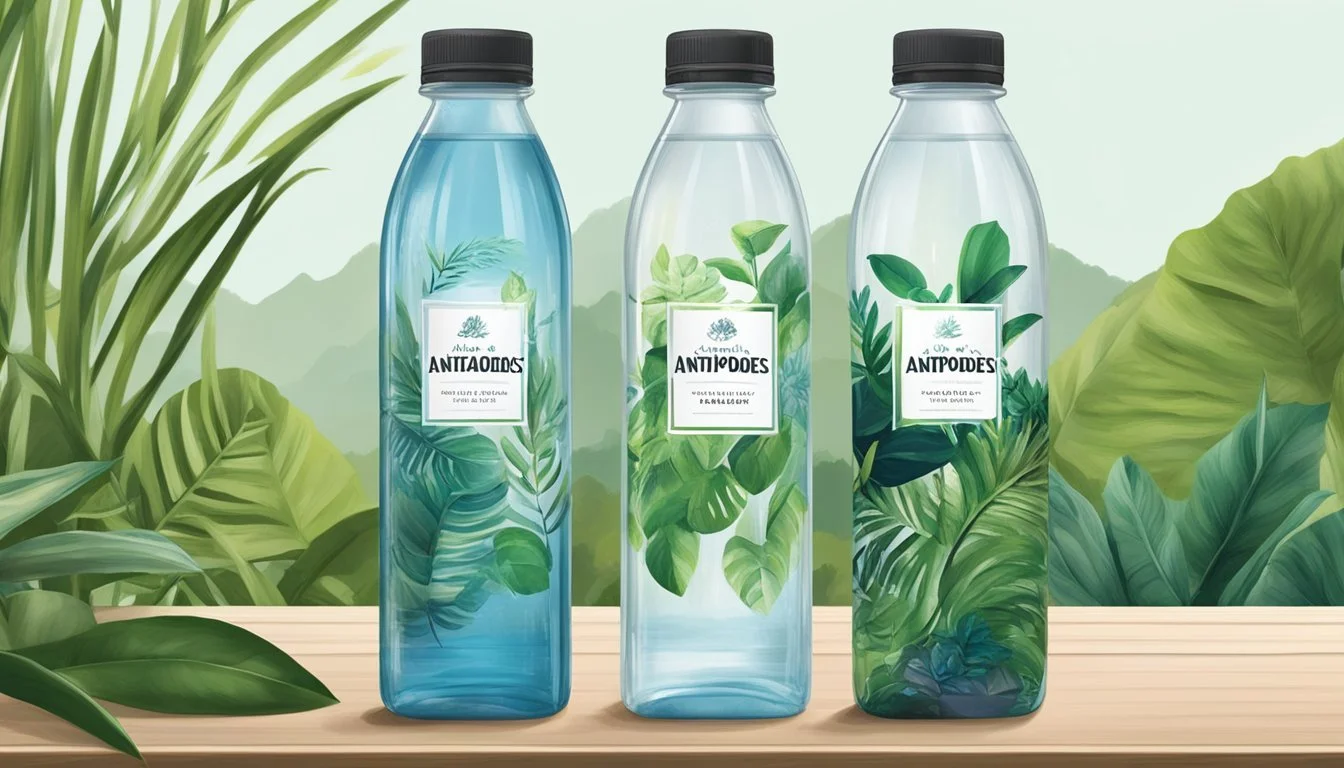Antipodes vs. Waiakea
Comparing Quality and Taste
Choosing between Antipodes and Waiakea bottled water can be a difficult task for discerning consumers. Both brands offer premium water with distinct characteristics, making them popular choices. Waiakea stands out with its naturally high alkaline pH of 8.8, which can help neutralize acidity within the body and support critical functions. Additionally, Waiakea has a strong commitment to sustainability, being the first US bottled water certified Carbon Neutral and donating over 5% of its revenue to nonprofits in Hawaii and globally.
Antipodes also delivers high-quality water, known for its purity and taste. This brand uses a unique filtration process and sources its water from pristine locations, ensuring a clean and refreshing experience. While Waiakea focuses on health benefits and environmental impact, Antipodes offers a more straightforward approach, emphasizing purity and a crisp taste.
Both brands cater to different preferences. Waiakea appeals to those interested in health and sustainability, while Antipodes attracts those seeking a pure, great-tasting water with minimal additives. Ultimately, Waiakea's combination of health benefits and environmental responsibility gives it an edge over Antipodes for many consumers.
Overview of Bottled Water
Bottled water has grown significantly in popularity, driven by convenience and perceptions of purity and taste. The examination of its historical rise and its particular impact in the United States reveals key factors.
History and Rise of Bottled Water
Bottled water's origins trace back to the 18th century in Europe, when mineral water from springs was bottled for health benefits. By the early 20th century, it gained popularity in North America. Technological advancements in the 1970s, such as polyethylene terephthalate (PET) bottles, made distribution easier and more cost-effective.
The turning point was in the 1990s and 2000s, with rising health consciousness and distrust in public water supplies contributing to the surge. Marketing campaigns emphasized purity and health benefits, setting the stage for exponential growth.
Bottled Water in the United States
In the United States, bottled water became the top choice of packaged beverages by 2012, surpassing carbonated soft drinks. The industry saw substantial investments in sustainability initiatives, with companies like Waiakea introducing carbon-neutral practices and using recycled plastics (RPET).
Consumers appreciate the convenience, taste, and perceived safety of bottled water. This trend correlates with increasing concerns about tap water quality and infrastructure issues. Today, bottled water remains a staple, reflecting a blend of innovation and customer preference.
Understanding Water Sources
Different bottled water brands derive their water from various sources, each with unique characteristics and benefits. These include natural springs, artesian wells, aquifers, and tap water, often processed and purified to varying extents.
Spring Water Vs. Artesian Water
Spring Water emerges naturally from underground sources to the surface. These sources often flow to the earth’s surface without mechanical aid, making them renewable by nature.
Artesian Water comes from artesian wells, where water is trapped between layers of rock. The natural pressure pushes the water up, often making it clean and pure. Waiakea is an example, drawing from a Hawaiian volcanic aquifer.
Aquifers and Water Purity
An Aquifer is an underground layer of water-bearing rock that can provide a high rate of water flow. These are natural reservoirs that accumulate water from rain and snowmelt filtering through the earth.
Water from aquifers tends to be free of pollutants due to the natural filtration process. Proper aquifer management ensures the sustainability and purity of bottled water.
Tap Water vs. Bottled Water
Tap Water is readily accessible and regulated by government standards to ensure safety. However, it may contain minerals, chlorine, and other substances that affect taste.
Bottled Water often undergoes additional filtration processes. Brands like Waiakea also infuse electrolytes and maintain specific pH levels, catering to consumer preferences for quality and flavor.
Composition and Health Benefits
Antipodes and Waiakea bottled waters offer distinct advantages through their unique compositions and associated health benefits. This section outlines their mineral content, pH levels, and hydration capabilities to provide a clear comparison.
Mineral Content and Daily Value
Antipodes provides essential minerals like calcium, magnesium, and potassium. These minerals support various bodily functions:
Calcium: Important for bone health
Magnesium: Crucial for nerve function
Potassium: Helps regulate fluid balance
Waiakea water stands out for its high silica content, providing 32.4 mg per serving. Silica benefits include:
Improved skin elasticity
Healthier hair and nails
Both brands offer bicarbonate, which aids in maintaining pH balance in the body.
Alkalinity and pH Levels
Antipodes has a pH level of approximately 7.8, classifying it as slightly alkaline. This can help neutralize stomach acid and promote digestive health.
Waiakea water, on the other hand, boasts a higher pH of 8.8. The more alkaline nature of Waiakea water supports:
Neutralizing body acidity
Enhancing overall bodily function
Higher pH levels can be particularly beneficial for those with acid reflux or similar conditions.
Hydration and Electrolytes
Antipodes includes natural electrolytes such as sodium, which is essential for:
Maintaining hydration
Supporting nerve and muscle function
Waiakea water also contains vital electrolytes, contributing to:
Enhanced hydration
Electrolyte balance during physical activities
The naturally occurring minerals in both waters enhance their taste, making them appealing choices for daily consumption. The presence of electrolytes in both brands is critical for optimal health and hydration, especially for active individuals.
The Unique Properties of Antipodes and Waiakea
Antipodes and Waiakea are distinct premium bottled water brands, each with unique attributes rooted in their respective sources and mineral compositions.
Antipodes: A Profile
Antipodes water is sourced from an artesian aquifer in the Bay of Plenty, New Zealand. The water is known for its high purity, achieved through natural filtering processes. This water passes through layers of ancient rock, resulting in exceptional clarity.
With a neutral pH of around 7, Antipodes is celebrated for its crisp and clean taste. The balanced mineral profile includes calcium, magnesium, and silica, contributing to the water's smooth mouthfeel. Antipodes is often favored in fine dining and luxury settings due to its pristine quality and elegant packaging.
Waiakea: Hawaiian Volcanic Water
Waiakea draws its water from a volcanic aquifer in Hawaii, near the Mauna Loa volcano. The water is naturally alkaline, with a pH range of 7.6 to 8.2, distinguishing it from many other bottled waters. Waiakea's mineral-rich composition includes electrolytes such as potassium, magnesium, and calcium, providing both hydration and a smooth taste.
Filtered through porous volcanic rock, Waiakea water accumulates minerals that enhance its health benefits. The high silica content (around 30 mg) lends a soft texture to the water. Waiakea also emphasizes sustainability, being Carbon Neutral certified and donating a portion of its revenue to global and local nonprofits, reinforcing its commitment to environmental and social responsibility.
Production and Purification Processes
Antipodes and Waiakea utilize distinct purification techniques and sustainability practices in their bottled water production, which are crucial for maintaining water quality and environmental responsibility.
Filtration and Purification Techniques
Waiakea water is naturally alkaline with a pH of 8.8. This water undergoes minimal processing, retaining its natural minerals and properties. It is sourced from the Mauna Loa volcano in Hawaii, filtered through porous volcanic rock, which naturally enhances its alkalinity and purity.
Antipodes, on the other hand, employs advanced purification methods including micro-filters, reverse osmosis, and ultraviolet exposure. This ensures a high level of purity, removing impurities down to 99.9%. They then infuse electrolytes to achieve a balanced pH level. These combined techniques guarantee clean and safe drinking water while balancing taste and mineral content.
Bottling and Sustainability Concerns
In terms of sustainability, Waiakea is notable for its commitment to environmental responsibility. The brand is certified CarbonNeutral and emphasizes the use of sustainable packaging. They donate a portion of their revenue to global and local non-profits, reinforcing their dedication to both people and the planet.
Antipodes also stresses sustainability in its production process. The company uses recyclable packaging materials and aims to minimize its ecological footprint. Both brands highlight the importance of environmental stewardship in their operations, addressing consumer concerns about the environmental impact of bottled water.
By focusing on these methods and sustainability practices, both Antipodes and Waiakea provide high-quality bottled water options with a conscious effort on maintaining purity and protecting the environment.
Environmental Impact and Sustainability
When comparing Antipodes and Waiakea, it's crucial to examine their environmental impact and sustainability efforts. Both brands prioritize eco-friendly practices, but their approaches and materials differ.
Packaging Materials and Recycling
Antipodes utilizes glass bottles, which are fully recyclable and can be reused multiple times. Glass production does have a higher energy cost, but the benefit is that it doesn't degrade during recycling. This makes glass an environmentally favorable option despite its weight, which can increase transportation carbon footprint.
Waiakea uses high-grade 100% rPET (recycled PET) bottles. This choice reduces the energy required for production by 85% compared to virgin plastic. Additionally, using rPET cuts water use by 99% and lowers carbon emissions by 79%, making it a highly sustainable alternative to conventional plastics.
Waiakea also emphasizes carbon neutrality and contributes over 5% of its revenue to environmental nonprofits, enhancing its commitment to the planet and community welfare. These contributions reflect a robust approach to reducing its overall carbon footprint and supporting broader environmental conservation efforts.
Taste and Consumption Experience
When choosing between Antipodes and Waiakea, taste and consumption experience are crucial factors. This section dives into preferences for still versus carbonated water and how alkaline water impacts taste.
Still vs. Carbonated Preferences
Antipodes offers both still and carbonated options, catering to diverse taste preferences. The still variety is known for its purity and clean finish, making it a favorite for hydration and daily consumption. The carbonated version provides a refreshing, effervescent bite perfect for meals or as a standalone beverage.
Waiakea, primarily known for its still water, emphasizes a smooth and crisp taste profile. This makes it ideal for those who prefer a natural, unaltered drinking experience. The brand's volcanic source imparts a subtle, unique mineral taste that sets it apart from other brands.
The Role of Alkaline Water in Taste
Waiakea's alkaline water, with a pH level of 8.2, offers a slightly sweeter taste due to its mineral content, including silica and electrolytes. This high pH level can provide a smoother mouthfeel and may even reduce acidity, appealing to those who find regular water too bland.
Antipodes, while not specifically marketed as alkaline, maintains a naturally occurring high pH due to its artesian source. This contributes to a balanced, clean flavor that doesn't overwhelm the palate. The presence of natural minerals in both still and carbonated varieties enhances the taste without the need for artificial additives.
Comparative Analysis
This section examines the price point, brand reputation, and market presence of Antipodes and Waiakea, providing essential insights for consumers making an informed decision.
Price Point and Value for Money
Antipodes is often priced higher due to its premium positioning and pristine source in New Zealand.
Waiakea, on the other hand, tends to offer a more competitive price, balancing quality with affordability.
Antipodes highlights its glass packaging, which may appeal to eco-conscious consumers despite the higher cost.
Waiakea uses recyclable BPA-free plastic, which is cost-effective and practical for a broader market. Both brands emphasize their water’s purity and mineral content, contributing to perceived value.
Brand Reputation and Consumer Reviews
Antipodes is celebrated for its commitment to sustainability and its luxurious perception.
It enjoys high ratings focused on its taste and packaging aesthetics, making it a favorite among environmentally conscious consumers and premium product enthusiasts.
Waiakea boasts a strong reputation, particularly for its naturally alkaline water and ethical practices.
Its positive reviews often mention the refreshing taste and health benefits related to its high pH and mineral content. Waiakea's commitment to social and environmental causes further enhances its reputation and appeal to a conscientious consumer base.
Market Presence and Accessibility
Antipodes has a niche market presence, predominantly available in high-end retailers, hotels, and fine dining establishments.
Its distribution channels focus on maintaining exclusive brand positioning, which can limit its widespread accessibility.
Waiakea enjoys broader market accessibility, being widely available in major grocery chains and online platforms.
This extensive distribution network contributes to its broad consumer reach. Waiakea’s commitment to sustainability is highlighted by its Carbon Neutral certification, enhancing brand visibility in eco-friendly marketplaces.
This comparative look underscores key differences in price, reputation, and market presence, aiding consumers in making a choice based on their preferences and values.
Conclusion
Antipodes and Waiakea both offer unique benefits that make them standout choices in the bottled water market.
Waiakea boasts a naturally alkaline pH range of 7.6 to 8.8, sourced from a volcanic well in Hawaii. The water contains essential minerals and electrolytes, supporting overall wellness.
On the other hand, Antipodes is renowned for its purity and clean taste. It prides itself on being sourced from deep aquifers, ensuring a high level of cleanliness.
Feature Waiakea Antipodes pH Level 7.6 - 8.8 7.0 Source Volcanic well, Hawaii Deep aquifers Key Benefits Natural alkalinity, minerals High purity, clean taste Sustainability Carbon neutral, 5% revenue donation Eco-friendly bottling practices
Top Picks: If pH balance and mineral richness are priorities, Waiakea may be the better choice. For those seeking pristine, clean water, Antipodes is recommended.
Staying hydrated is crucial, and both brands offer premium options that cater to different preferences and tastes.










